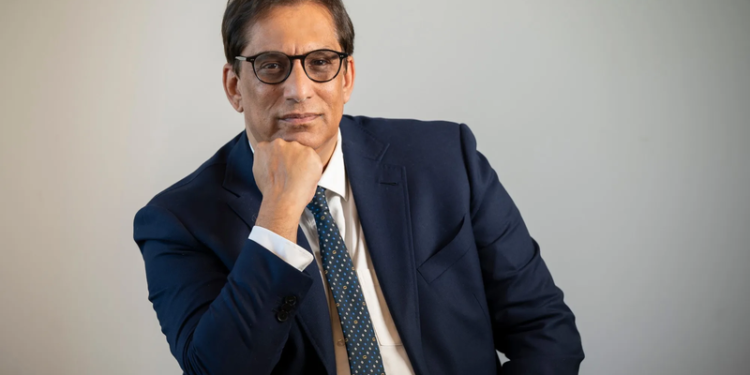The World Economic Forum (WEF) Annual Meeting in Davos, Switzerland, on January 20-24 will again bring a cohort of the world’s best leaders in business, government, state-owned enterprises, academia, and other institutions together to foster new ways of thinking in addressing key issues facing the globe, said Sekunjalo Investment Holdings chairman Dr Iqbal Survé.
The prominent South African entrepreneur, philanthropist, medical doctor, and chairman of Sekunjalo and Independent Media, one of South Africa’s largest media companies that also publishes Business Report, was interviewed on Wednesday ahead of his participation at the meeting.
The key theme this year is “Collaboration for the Intelligent Age,” but geopolitical developments and challenges facing the global economy will also be addressed.
The discussions will focus on how converging technologies such as AI, quantum computing, and biotech can be harnessed to boost productivity and living standards while addressing challenges like climate change and economic fragmentation.
Dr Survé says that he, representing Sekunjalo and the Survé family business interests, and Patrice Motsepe, the founder of African Rainbow Minerals and African Rainbow Capital, were the first South African companies to become members of the 500-member-strong WEF in 2007, and he has attended the WEF’s annual meeting every year since then, barring during the Covid-19 pandemic.
“There are many thousands of bigger companies around the world that are bigger than us, that would also love to be members of the WEF, but they do not meet the WEF’s criteria,” Dr Survé says.
These criteria include innovative business models, market influence, regional impact, corporate citizenship, and visionary leadership. Forum members are selectively sought by the WEF for their contributions to global economic prosperity and their role as ambassadors for public-private cooperation.
Dr Survé says that while Sekunjalo Group’s diversified business investments are not generally known domestically for its international investments and businesses, the Survé family and Sekunjalo hold extensive technology investments in the US, China, Germany, and the United Arab Emirates.
He says that one of his own “critical” agendas at the WEF meeting this year includes plans to engage with stakeholders on some new technology investments that are being planned in China and the Middle East.
Reflecting on some of the benefits he derived from the first decade of WEF meetings that he attended, Dr Survé says many new partnerships were formed with multinational companies during this period, such as with Siemens, Nokia, and Saab.
It was also a period where he witnessed the growth of many new technologies featured at the WEF in the global economy.
Broadly, during the second decade of his attendance at the meetings, Dr Survé says he was happy to see Africa and its economies, challenges, and emerging businesses become a much more important part of the meeting proceedings – previously, although not ignored, Africa was largely bypassed in the discussions, he says.
Also at recent WEF meetings, there has been a much stronger focus on ways to address challenges of climate change and sustainability.
Dr Survé says South Africa’s own interests have waned somewhat at the meeting, due to fewer delegates attending the event and because the President has not attended for a few years, but this might change this year as President Cyril Ramaphosa has indicated he intends to attend. US President-elect Donald Trump is also scheduled to attend this year’s meeting after his inauguration.
Dr Survé has held a number of positions at the WEF, including Vice-chairman of The WEF Global Agenda Council for Emerging Multinationals, and has participated in many other capacities at WEF panel discussions, meetings, and other collaborations.
He was also chairman of the Global Growth Companies (GGC) Advisory Board at the WEF, which he says provided him with an inside view into the spectacular growth and emergence of many of the world’s current leading technology giants, such as Google.
His founding chairmanship of the BRICS (Brazil, Russia, India, China, and South Africa) Business Council and his role in driving economic initiatives between these countries also become significant in these discussions.
Dr Survé says he has also seen many of the WEF Young Global Leaders later take high political office, such as Prime Minister, or become big business leaders.
The WEF’s Forum of Young Global Leaders was established in 2004 and brings together exceptional young leaders from around the world who have demonstrated a commitment to making a positive impact on society. These leaders typically also come from diverse backgrounds, including business, government, academia, and civil society.
Dr Survé says that also on his own agenda at this year’s WEF meeting will be to further his understanding of the latest developments in global media, legacy media, and international media networks.
He says that while there have been some conspiracy theories globally about what delegates supposedly do at the WEF annual meeting, in fact, each delegate is free to determine their own outcome from the event and its key themes, based on what part of the proceedings they choose to participate in, who they meet, and any other business dealings or discussions they might undertake.
He says that while the cost of attending the Annual Meeting in Davos might be considered high, considering flights to Switzerland and relatively expensive accommodation given that it is all booked up by WEF delegates, the benefits that can be derived from the unprecedented access to an elite group of global leaders, in a confined and safe forum, far outweigh the financial expense.
“There is no other place in the world where a leader can get this kind of access to other global leaders and opportunities,” he says.
This year’s Annual Meeting will bring together close to 3 000 leaders from diverse geographies and industries to drive dialogue, build trust, and catalyse sustainable solutions to shared challenges. Over 1 600 business leaders will attend, including over 900 of the world’s top CEOs and chairmen.

There will be a strong representation from governments this year, with more than 350 government leaders expected to attend, including more than 60 heads of state and government.
The meeting comes at a time of deep global uncertainty brought on by geopolitical tensions, economic fragmentation, and accelerating climate change.
Other top political leaders taking part include Ursula von der Leyen, President of the European Commission; Ding Xuexiang, Vice-Premier of the People’s Republic of China; Olaf Scholz, Federal Chancellor of Germany; Javier Milei, President of Argentina; Roberta Metsola, President of the European Parliament; Pedro Sánchez, Prime Minister of Spain; and Karin Keller-Sutter, President of the Swiss Confederation for 2025.
Heads of international organizations taking part include Ngozi Okonjo-Iweala, DG of the World Trade Organization; Kristalina Georgieva, MD of the International Monetary Fund; Mark Rutte, Secretary-General of the North Atlantic Treaty Organization; Tedros Adhanom Ghebreyesus, DG of the World Health Organization; and Achim Steiner, Administrator of the United Nations Development Programme.









